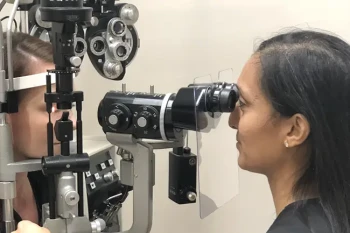
You’ve decided on an important step in your continued pursuit of clear vision: cataract surgery. After consulting with your physician about what types of lens options are available for you and what the surgical process is like, you might still have some lingering questions about what to do following your treatment.
You’re about to experience life-changing results after your cataract surgery, but there are just a few housekeeping items to take care of to ensure that your post-op care runs smoothly.
In This Article...
- Cataract Post-Op Tip 1: Use your prescribed eye drops
- Cataract Post-Op Tip 2: Wear sunglasses outside
- Cataract Post-Op Tip 3: Change your daily habits
Use your prescribed eye drops
Like any surgical treatment, your physician may prescribe medication to mitigate the initial side effects and begin your recovery process. For cataract surgery, this regimen will include three types of eye drops:
- Antibiotic drops to avoid an infection
- Steroidal or non-steroidal anti-inflammatory drops to reduce swelling
- Artificial tears to lubricate the eyes
Alexandra "Ola" Pietraszkiewicz, MD, a CEENTA neuro-ophthalmologist and cataract surgeon at our Belmont and Pineville offices, elaborates on artificial tears. "By far, the most common cause of post-operative discomfort is dry eye. Starting a regimen of preservative-free artificial tears can make a big difference, and some patients benefit from continuing lubricating drops beyond the immediate post-operative period."
Be sure to follow your prescription plan as written by your physician and reach out to them if you have any questions or concerns.
Wear sunglasses outside
During your recovery period, your eyes will be more sensitive to stimuli and light. According to Dr. Pietraszkiewicz, "Light sensitivity, or photophobia, is typically present for the first couple of days after surgery because of the natural response of the cornea and iris. It gets better as the eye heals with the help of prescription eye drops. It is important to talk to your doctor if light sensitivity persists or worsens over time, as this can be a symptom of dryness, inflammation, or rarely, infection."
Although modern intraocular lens implants have built-in UV protection, it is still important to wear UV-blocking sunglasses outdoors after you have cataract surgery. This not only improves comfort, but further helps to protect the retina from harmful rays.
Change your daily habits
There’s just one more hurdle between you and a life without blurry vision: your daily habits.
Your routine will need to be adjusted for a few weeks after your treatment, such as:
- Avoiding eye makeup to prevent possible infections and irritations
- Wearing an eye shield at night
- Limiting rigorous exercise and heavy lifting
- Preventing water and soap from getting in your eye
- Keeping your fingers away from your eyes
Clear vision is right in front of you, and by following these steps after your cataract surgery you will be much more likely to achieve the results you want. Yet if you’re still on the fence about receiving cataract surgery, CEENTA is here to help. Our cataract specialists across nearly twenty offices offer both traditional and laser-assisted surgical options along with customized lenses for your unique need.
Schedule your cataract consultation with Dr. Pietraszkiewicz in Belmont or Pineville today by using our online scheduling tool.
This blog is for informational purposes only. For specific medical questions, please consult your doctor.
You may also be interested in

Cataracts have more symptoms than just a milky-white appearance. Learn more about some of the lesser-known symptoms of cataracts with cataract surgeon Allison Baker, MD.

Beyond cataract removal, find out if cataract surgery can help with nearsightedness, farsightedness, astigmatism, and night blindness.

Champagne is perhaps the most popular type of sparkling wine on the market, but do you know how to open it safely? Find out how to prevent eye damage from a champagne cork with CEENTA.
Leave a Comment
Back to News

